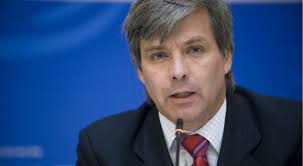By Andrew Warshaw
March 2 – Harold Mayne-Nicholls, the FIFA-appointed official who led the inspection team that evaluated the credentials of all 2018 and 2022 World Cup bidding candidates, is going to the Court of Arbitration for Sport (CAS) in a last-ditch attempt to clear his name and overturn a three-year ban for seeking unpaid intern work in Qatar for relatives.
According to The Associated Press, Mayne-Nicholls’ hearing could be the first time that evidence from former FIFA ethics prosecutor Michael Garcia’s investigation into the two World Cup bid contests is tested in a court outside FIFA’s own judicial system.
The Chilean was originally banned for seven years in July 2015 after being found guilty of “repeatedly asking for personal favours” from the Qataris who went on to be awarded the 2022 tournament.
The ban was imposed after an email exchange came to light requesting possible work placements for his son and a nephew at the famed Aspire youth academy in Doha. Aspire was strongly linked to Qatar’s successful bid and FIFA’s ethics judging chamber took the view that Mayne-Nicholls had seriously violated his responsibilities.
Ethics judges were anxious to send out a strong message that Mayne-Nicholls, as head of the technical inspection team, had a special responsibility in terms of neutrality and that anything which could potentially endanger the independent evaluation of World Cup bidders was a serious conflict of interest – not least actively asking for personal favours with those close to a bid committee, regardless of the outcome of such communication.
FIFA’s chief ethics judge Hans-Joachim Eckert is understood to have personally felt that the unique position Mayne-Nicholls held meant he had to be given a severe sanction. Yet whilst his conduct was incredibly naive given the sensitivity of the World Cup bid process, he has long insisted he did not in any way benefit personally – unlike other FIFA officials banned for a similar length of time for far worse offenses.
Even more significantly, the report delivered by Mayne-Nicholls’ six-member technical inspection team gave Qatar the worst ranking of all the candidates for the 2022 World Cup saying it was a “high risk” option. That this advice was ultimately ignored by the FIFA executive committee was hardly something that could be blamed on the Chilean.
Mayne Nicholls felt he had been harshly treated and FIFA’s appeals committee agreed with him. Last April, they cut the suspension from seven to three years. Delivering its verdict at the time, the appeals committee explained: “While agreeing with the principles and arguments presented by the adjudicatory chamber, the Appeal Committee deemed that the sanction imposed was not proportionate to the breaches committed.”
According to AP, Mayne-Nicholls was unable to file a further appeal at CAS until FIFA’s appeal committee provided written reasons for his ban. That document was apparently only sent 10 months after the decision to reduce his ban – clearing the way for him to now try and have it scrapped completely.
Contact the writer of this story at moc.l1714082093labto1714082093ofdlr1714082093owedi1714082093sni@w1714082093ahsra1714082093w.wer1714082093dna1714082093

